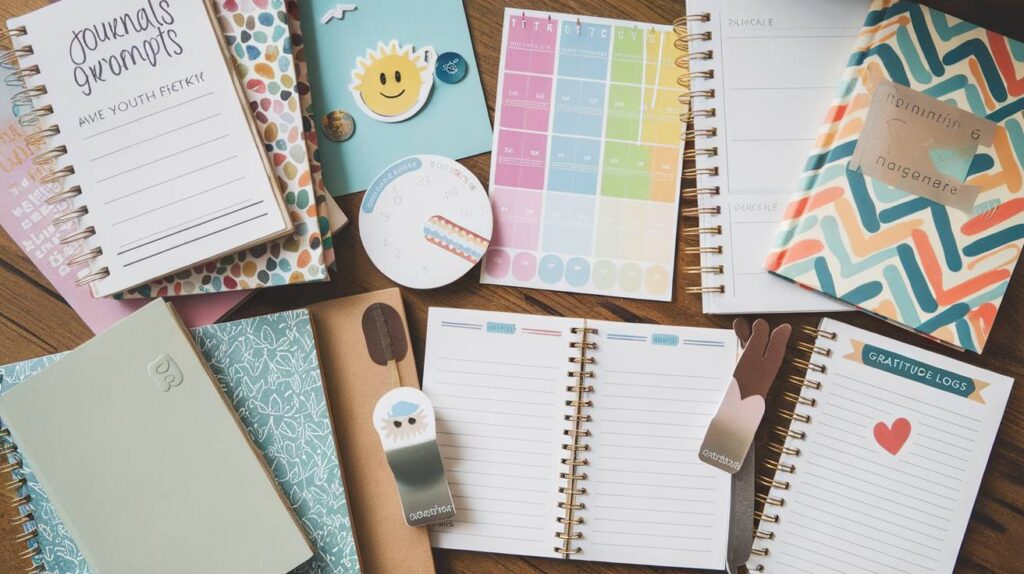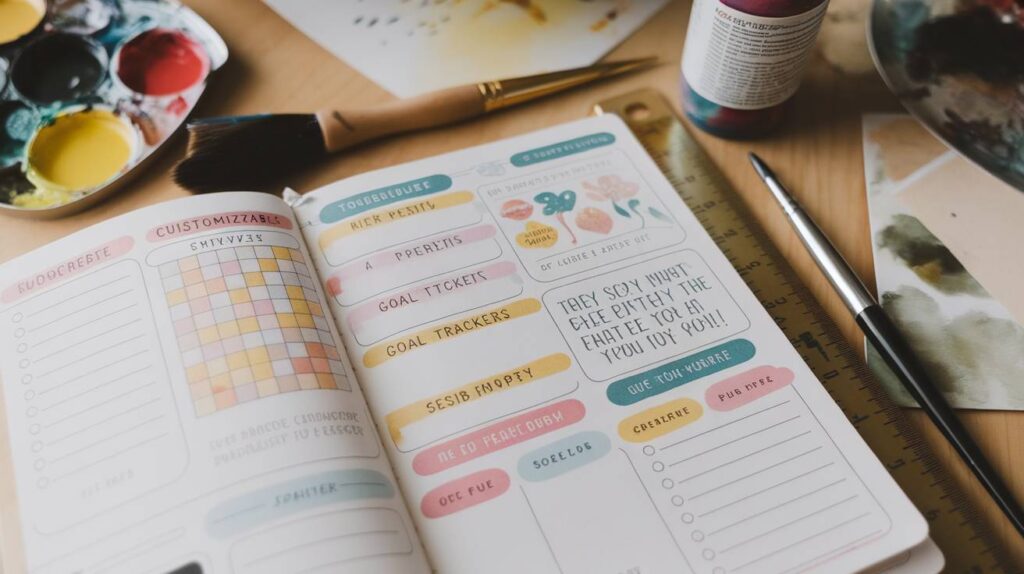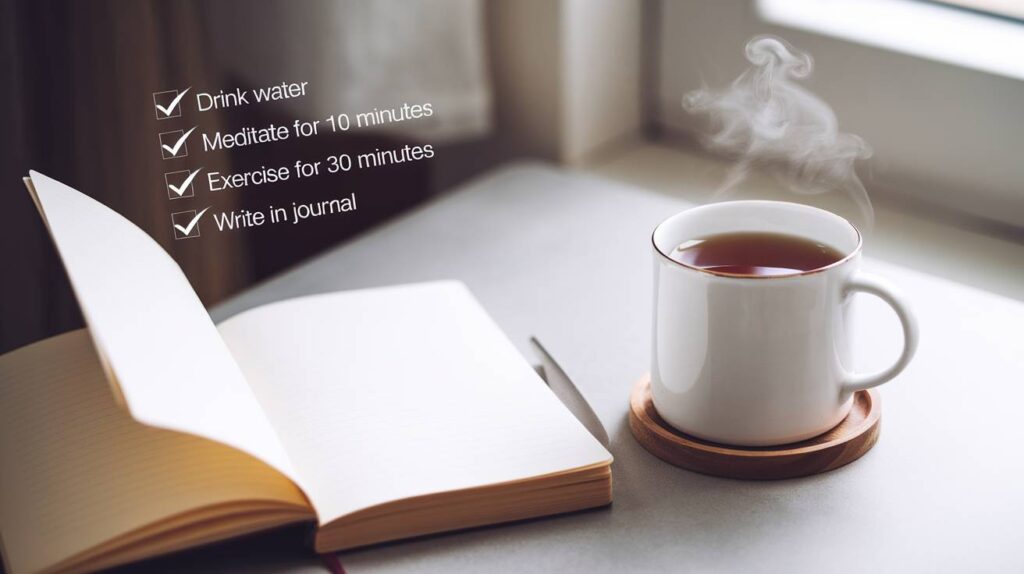Do you ever feel like life’s chaos is swallowing you whole? Imagine turning that overwhelming stress into manageable steps simply by putting pen to paper. Welcome to the transformative world of stress journals and planners—a personal powerhouse for mental clarity and peace.
Key Takeaways
- Understanding Stress Journals and Planners: Discover how these tools act as superheroes for your mental health, helping you organize thoughts and emotions.
- Types of Stress Journals and Planners: Explore various options like guided journals, gratitude journals, mood trackers, and goal-setting planners to find your perfect match.
- Features to Look For: Learn about essential features such as customizability, prompts, goal tracking, and inspirational quotes that enhance your journaling experience.
- Benefits of Using Stress Journals and Planners: Uncover how these tools aid in stress management, increase self-awareness, improve mindfulness, and boost productivity.
- Tips for Getting the Most Out of Your Journal or Planner: Get practical advice on establishing routines, setting realistic goals, incorporating self-care, and knowing when to seek professional help.
Understanding Stress Journals and Planners
Importance of Stress Journals and Planners
Stress journals and planners are like superheroes for your brain—they help people deal with life’s ups and downs by giving them a place to organize their thoughts and feelings. They make it easier to figure out what’s going on in that busy mind of yours.

Let’s break down why these journals and planners are worth their weight in gold:
| Benefits of Stress Journals and Planners | What’s the Deal? |
|---|---|
| Self-Reflection | They make you hit pause and think about your day, so you can see what’s stressing you out and maybe even why. |
| Emotional Expression | They’re like your personal diary that listens without interrupting—a place to pour out all those bottled-up feelings. |
| Stress Monitoring | When you write it down, it’s easier to spot what triggers your stress and work on ways to handle it. |
Adding a stress journal or planner to your daily toolkit can help make sense of your emotional roller coaster and keep your mental health in check.
How Stress Journals and Planners Can Help
These little habit trackers can do wonders for your peace of mind, like:
- Stress Management: Jotting down your stress triggers and what helps or doesn’t can be like having a map to navigate your stress journey. Check out our write-up on stress management plan for more tricks.
- Mindfulness Improvement: Putting pen to paper (or fingers to keyboard) helps you slow down and really think about how you’re feeling and why.
- Routine Establishment: Making journaling or planning part of your day keeps things normal when everything else feels upside down.
- Goal Setting: Writing out your dreams in a planner helps you see the steps you need to take, so everything feels a tad less overwhelming.
- Support for Professional Help: If you’re chatting with a therapist, your journal can be a talking point to help get the ball rolling. Peek at our article on chronic stress symptoms to know when to call in reinforcements.
Stress journals and planners can be your go-to for navigating life’s chaos and mental health hurdles. By getting into the habit, you might find the balance and calm you’ve been chasing.
Types of Stress Journals
Stress journals can be your go-to tool for wrestling with anxiety and boosting your mood. There’s no one-size-fits-all, so let’s peek at four popular types: guided journals, gratitude journals, mood trackers, and goal-setting journals.
“Journaling is like whispering to one’s self and listening at the same time.”
— Mina Murray
Guided Journals
Guided journals walk you through prompts and questions to mull over your thoughts and feelings. They have exercises that boost self-awareness and help you chill out. If structure helps you manage stress and feelings, you’ll probably dig these.
| What’s Inside | What’s Good |
|---|---|
| Guided prompts | Encourages deep thinking |
| Handy exercises | Helps squash stress |
| Regular check-ins | Keeps tabs on your journey |
Need a nudge? Check out stress journal prompts for fresh ideas and a better journaling ride.
Gratitude Journals
Flip your focus with gratitude journals. You jot down what you’re thankful for and shift your perspective. It’s a sweet way to cut down on stress and anxiety, giving your mental health a much-needed lift.
| What’s Inside | What’s Good |
|---|---|
| Daily thank-you notes | Switches focus to the bright side |
| Thinking about good times | Boosts your mood |
| Mindfulness exercises | Makes life sweeter |
These gratitude exercises can also fit nicely into a bigger stress management plan for tackling life’s daily hurdles.
Mood Trackers
Mood trackers let you track your feelings and see where they take you over time. Jotting down daily moods helps spot patterns, showing what messes with your emotions—key for handling stress.
| What’s Inside | What’s Good |
|---|---|
| Daily mood entries | Raises self-awareness |
| See your mood waves | Pinpoints stress triggers |
| Reflection spots | Helps sort emotions |
Great for keeping tabs on chronic stress symptoms and crafting plans to handle them.
Goal Setting Journals
Goal-setting journals help you pinpoint, plot, and track your goals. Clear objectives lead to concrete steps, cutting down on stress from feeling swamped and putting you in the driver’s seat.
| What’s Inside | What’s Good |
|---|---|
| SMART goals guide | Keeps goals real and reachable |
| Keep track of wins | Keeps the motivation train rolling |
| Look-back prompts | Helps adjust plans as needed |
Tying your goals to improved productivity is a smart move for tackling work stress.
Picking the right stress journal is like finding the perfect tool for your unique needs. Each one offers its own route to clearing your mind and easing stress.

Types of Stress Planners
Stress planners are like your sidekick for keeping daily chaos in check and kicking life’s stressors to the curb. They’re about turning anxiety into action. Check out a few types that can help your mind stay sharp and focused.
“Writing in a journal reminds you of your goals and of your learning in life. It offers a place where you can hold a deliberate, thoughtful conversation with yourself.”
— Robin Sharma
Daily Planners
Daily planners are the bomb for getting your day into shape. They’ve got the room for all those appointments, to-do lists, and notes. They let you sort out what needs doing and yer schedule it in a way that can chill you out.
| Feature | How it Helps |
|---|---|
| Room for Daily Stuff | Keeps your responsibilities straight. |
| Timing Spots | Lets you decide when to do important tasks. |
| Reflection Page | Let’s you wind down and think about what you’ve done. |
Weekly Planners
If you need to see the bigger picture, weekly planners are where it’s at. They give you a heads-up on what the entire week holds. With these, you’ve got the power to squeeze in some me-time or spot stressors ahead of time.
| Feature | How it Helps |
|---|---|
| Weekly View | Gives a snapshot of all week’s activities. |
| Goal Setting | Keeps an eye on what you wanna achieve. |
| Progress Checks | Tracks what you’ve ticked off your list. |
Goal Setting Planners
Feeling like you’ve got some mountains to climb? Goal-setting planners break those peaks into small, hikeable hills. They help you piece big dreams into smaller, less scary parts—think of them as a motivational map that lets you chase growth without losing steam.
| Feature | How it Helps |
|---|---|
| Goal Breakdown | Turns dreams into doables. |
| Monthly Check-In | Pushes you to peek back and see progress. |
| Visual Milestones | Shows you just how far you’ve come. |
Habit Trackers
For those wanting to get the good habits rolling, habit trackers are it. By jotting things down daily, you can spot habits that make you feel awesome or super stressed. You get to choose more of what works and dodge what doesn’t.
| Feature | How it Helps |
|---|---|
| Daily Log | Keeps tabs on habits over time. |
| Progress Graphs | Motivates with a visual boost to keep you going. |
| Reflection Boosts | Encourages you to think about your habits’ effects. |
So, find the planner that dances to your tune. Including planners in routines can boost organization and smart decision-making, leading to mental peace. For more secrets to calm those nerves, peek into our pieces on handling work stress and quick chill out tricks.

Features to Look For
When picking out stress journals and planners, certain bells and whistles can supercharge how well they work. The right stuff can make them feel more like a comfy fit and help turn stress into a manageable beast.
Customizability
A journal or planner that feels like your own? That’s the dream! Being able to tweak it to suit your likes means it’s doing just what you want it to. Some folks like blank pages to scribble freely; others dig prompts for a more guided reflection. This kind of personal touch keeps people more interested and thoughtful about the process.
| Customizable Features | What’s This About? |
|---|---|
| Page Layout | Choices like blank, lined, or even little pockets |
| Cover Design | Pick from a bunch of styles and themes |
| Sections | Add or ditch sections as you fancy |
Prompts and Exercises
Prompts and exercises act like a gentle nudge to get the mind jogging. A journal or planner with prompts helps to explore feelings without feeling lost. Exercises such as breathing or self-checks can take the edge off a bad day and boost that good-feeling meter. Peek at our fun read on stress journal prompts for a nudge.
| Types of Prompts | Little Nudge Ideas |
|---|---|
| Reflective Questions | “What made you grin today?” |
| Mood Check-Ins | Take a peek at your daily feels |
| Gratitude Lists | List three things that made you thankful |
Goal Tracking
A solid stress planner isn’t complete without goal-tracking goodies. Realistic goals act as little stepping stones and help keep track of progress, making those little wins even sweeter. Regular peeks at your goals make sure they’re still your #1 priorities. Check our write-up on stress management plan for some more good reads.
| Goal Tracking Features | Why It’s Cool |
|---|---|
| Monthly Goals | Chop big goals into bite-size chunks |
| Progress Checklists | See your wins in one glance |
| Reflection Sections | Look back at what worked and what didn’t |
Inspirational Quotes
Inspirational quotes in journals are like a breath of fresh air. They scatter motivation and good vibes across the pages, helping during tough times. These little power packs remind you to stay strong and focus on what’s crucial for you. Absorbing such positive lines daily nurtures more sunny-side-up thinking.
| Benefits of Inspirational Quotes | Sample Nuggets |
|---|---|
| Encouragement | “Believe you can and you’re halfway there.” |
| Motivation | “The only limit is your mind.” |
| Positive Reinforcement | “You are stronger than you think.” |
The right mix of features in stress journals and planners can really crank up how they help manage stress. Customization, prompts, goal tracking, and inspiring quotes all roll into one effective tool for mental health goodies.

Benefits of Using Stress Journals and Planners
Stress journals and planners do more than manage stress—they boost your overall well-being and productivity. Let’s check out why they’re worth picking up.
Stress Management
These little books are like your personal anxiety dump. Writing down your daily challenges helps you see what’s bugging you the most and figure out why. This awareness can be your secret weapon in stress-busting.
| What It Helps With | How It Helps |
|---|---|
| Spotting the Bad Vibes | Jotting down stressors makes them easy to spot and tackle. |
| Plotting Growth | Regular notes can show just how far you’ve come. |
| Clearing Mental Clutter | A planner organizes chaos, giving your mind a break. |
Need more tips on handling stress and its effects? Visit our pages on physical symptoms of stress and work stress management.
Increased Self-Awareness
Writing in a stress journal is like holding a mirror up to your soul. It helps you understand your feelings, reactions, and even those pesky habits.
| What’s Great About It | Why It’s Helpful |
|---|---|
| Habit of Watching Yourself | Keeps you in the zone of self-reflection. |
| Lightbulb Moments | You’ll start seeing what really nudges your stress or brings you joy. |
| Crafting Better Habits | Once you know yourself, changing for the better gets easier. |
Check out self-reflective prompts in our article on stress journal prompts.
Improved Mindfulness
Being mindful—fully present in each moment without being overwhelmed—is a stress journal’s best trick. They gently nudge you to slow down and just be, cutting down anxiety.
| Reasons to Love It | What It Does |
|---|---|
| Sticking to the Here and Now | Writing about everyday things keeps your mind in the now. |
| Finding the Good Stuff | Adding sections for gratitude can light up your day. |
| Taming the Mind | Writing helps stop that spiral of negative thoughts. |
For more on mindfulness, try breathing exercises stress and nature therapy stress relief.
Enhanced Productivity
A good planner is like your personal assistant, helping you sort out what’s important without breaking a sweat. Prioritizing tasks and setting goals have never been easier.
| What It Gives You | Why You Need It |
|---|---|
| Cracking the Goal Code | It turns those endless lists into doable tasks. |
| Finding Me-Time | Schedules in time for you, killing the risk of burnout. |
| Staying Laser-Focused | It makes distractions disappear with a click. |
Improve your scheduling prowess with our article on time management stress relief and see how it boosts productivity.
By bringing stress journals and planners into your day, you’re not only bolstering your mental health but also taking charge of your overall well-being.
Integrating Journals and Planners into Your Routine
So you’ve picked your stress journal or planner, now it’s time to weave it into your daily life like your favorite pair of jeans. The real magic of these tools happens when used consistently, adding serious perks to your everyday grind.

Establishing a Routine
Finding a slot for your journal or planner in your day is like finding the perfect spot for your favorite chair. Some folks swear by jotting down thoughts with their morning coffee, while others prefer a recap of their day before hitting the hay. Even just 10-15 minutes can work wonders for clearing the mental clutter.
| Time of Day | Activity | Benefits |
|---|---|---|
| Morning | Jot down goals or set intentions | Kicks off your day on the right foot |
| Evening | Reflect on events and jot down feelings | Boosts self-awareness and chills you out |
Setting Realistic Goals
Journals and planners are like personal trainers for your mind—they help you set goals. Make sure these goals don’t look like a mountain you can’t climb. Break ’em down into bite-sized chunks, and suddenly you’re halfway up before you know it.
| Goal Type | Example | Steps to Achieve |
|---|---|---|
| Short-term goals | Write in your journal daily for a week | Set a phone alert, keep it by your bed |
| Long-term goals | Tame stress with mindfulness practices | Pick practices you like and pencil them in |
Picking goals that are just right can boost your confidence and get good habits rolling.
Incorporating Self-Care Practices
Self-care isn’t about bubble baths and chocolate (though those are nice too). It’s about treating your mind and body well. A journal can be your sidekick in making sure you stick to your self-care plans.
| Self-Care Practice | Frequency | Journal/Planner Activity |
|---|---|---|
| Meditation | Daily | Note time and how it made you feel |
| Exercise | 3-4 times a week | Record workouts and any body changes |
| Nature walks | Weekly | Jot down what you see, and how it feels |
These little logs help keep you accountable and show you how self-care boosts your mood. For more quick stress busters, check out our piece on quick stress relief techniques and level up your routine.
By sticking to your journaling routine, choosing realistic goals, and sprinkling in self-care, your stress journal or planner transforms into a must-have stress-busting ninja.
Tips for Getting the Most Out of Your Journal or Planner
Using a journal or planner can be your secret weapon for beating stress. Let’s dive into some practical ways to make them work wonders for you.
Consistency is Key
Getting the best from your journal means being regular with it. Jotting down stuff daily or weekly can help you build a routine that gets you thinking about what’s bugging you. It’s like having a chat with yourself, opening up about what gets on your nerves, and figuring out why. Here’s why sticking to a schedule works:
| When You Write | Why It Works |
|---|---|
| Daily | Keeps worries fresh and helps you reflect often. |
| Weekly | Offers a breather to plan and think about things. |
| Monthly | Lets you track how far you’ve come and spot trends. |
Check Your Progress Regularly
Going back and reading what you wrote earlier can be super enlightening. It’s like watching a movie of your life, seeing how moods or stress levels ebb and flow. This can light a fire under you or show where you might need a tweak. For more tips on fighting stress, check out this piece on stress management plan.
Be Ready to Switch it Up
No one-size-fits-all here. If something’s not clicking, mix things up. Changing your writing prompts or rearranging how you plan could make all the difference. This flexibility keeps things interesting and suited to what you need at the time. Looking for fresh ideas? See stress journal prompts.
Get Help When You Need It
Journals and planners are great—really, they are. But sometimes, we all need a little extra help. If stress is really getting you down, a chat with a pro could be the way to go. Therapists or counselors have tried-and-true tools that can give you the boost you need. Check out quick stress relief techniques for a sneak peek into what they might suggest.
Trying out these tips can make your journaling journey smoother and way more satisfying, all while giving your stress levels a much-needed break.
Tips for Getting the Most Out of Your Journal or Planner
- Start Small and Be Consistent: Dedicate a specific time each day, even just 10 minutes, to write in your journal or update your planner. Consistency helps build a lasting habit.
- Set Clear and Realistic Goals: Break down larger goals into smaller, achievable steps. This makes them less daunting and more manageable.
- Be Honest and Reflective: Write openly about your feelings and experiences. Honesty fosters deeper self-understanding and growth.
- Use Prompts When Needed: If you’re unsure what to write, utilize prompts or questions to spark insight. This can lead to unexpected discoveries about yourself.
- Incorporate Self-Care Activities: Schedule and record activities that nurture your well-being, such as exercise, meditation, or hobbies you enjoy.
- Review and Reflect Regularly: Periodically read previous entries to identify patterns, celebrate progress, and adjust your strategies as needed.
- Personalize Your Journal or Planner: Make it your own with colors, stickers, or sketches. Personalization can increase your connection to the practice.
- Stay Flexible and Adaptable: Allow your journaling approach to evolve over time. If something isn’t working, don’t hesitate to change it up.
- Combine with Mindfulness Practices: Pair journaling with mindfulness techniques like deep breathing or meditation to enhance stress relief.
- Seek Support When Necessary: If stress feels unmanageable, consider reaching out to a mental health professional for additional support.
Conclusion
In a world where stress often feels overwhelming, stress journals and planners offer a pathway to clarity and control. They are more than mere notebooks; they are companions on your journey toward mental well-being. By embracing these tools, you empower yourself to transform chaotic thoughts into structured plans and fleeting emotions into insightful reflections.
Selecting the right journal or planner tailored to your needs—be it a guided journal, gratitude log, mood tracker, or goal-setting planner—sets the foundation for effective stress management. Incorporating features like customizability, inspirational quotes, and goal-tracking amplifies their impact, making the process both enjoyable and meaningful.
The benefits are far-reaching: enhancing self-awareness, fostering mindfulness, boosting productivity, and ultimately leading to a more balanced and fulfilling life. Remember, the journey of self-improvement is ongoing. By integrating journaling and planning into your daily routine, setting realistic goals, and practicing self-care, you pave the way for lasting positive change.
While these tools are powerful, don’t hesitate to seek professional support when needed. Combining personal practices with expert guidance can provide a comprehensive approach to managing stress and promoting overall well-being.
FAQs
What is a stress journal, and how can it help me manage stress?
A stress journal is a personal diary where you record daily events, thoughts, and feelings that contribute to your stress levels. By writing them down, you can identify triggers, understand your reactions, and develop strategies to manage stress effectively.
What features should I look for in a stress planner?
Look for features like customizability, guided prompts, goal-tracking sections, and inspirational quotes. These elements make the planner more engaging and tailored to your needs, enhancing its effectiveness in helping you manage stress.
How do I integrate journaling into my daily routine?
Start by setting aside 10–15 minutes each day, either in the morning or evening. Consistency is key. Use prompts or free writing to explore your thoughts and feelings. Over time, this practice becomes a habit that supports your mental well-being.
Can journaling improve my productivity?
Absolutely! Journaling helps organize your thoughts, set clear goals, and prioritize tasks. This clarity can enhance focus, reduce procrastination, and boost overall productivity.
Should I seek professional help in addition to journaling?
If stress is significantly impacting your daily life, it’s advisable to consult a mental health professional. Journaling can complement therapy by providing insights into your thoughts and behaviors.
Resources
- Stress Management Techniques – American Psychological Association
- Mindfulness Meditation – Mindful.org
- Understanding Anxiety and Stress – National Institute of Mental Health
- Quick Stress Relief Strategies – HelpGuide.org
- Time Management Tips – Mind Tools






